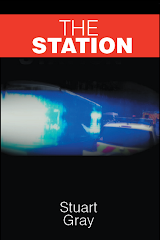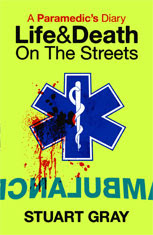Day shift: Nine calls; two by car; three assisted-only; four by ambulance.
Stats: 1 RTC; 1 Asthma; 2 eTOH; 1 Head Injury; 2 DOAB; 1 EP fit; 1 Drug o/d.
While chatting to a CRU colleague, he received a call to a RTC in which a man had fallen from his moped. I offered to tag along and help out in case the injuries were minor enough to warrant a trip in the car, so we both left the same spot for the trip less than a mile away and I arrived to find that I had been beaten to it by the two-wheeled speedster. This says a lot for the efficiency of cycle lanes in London – at least, that’s how I will look at it.
The moped rider was sitting on a step, chatting to my colleague and looking like a minor casualty. His face, hands and feet were cut and grazed but otherwise he was well. The fall had taken place at 30mph he said but then everyone involved in an accident in a 30 mph zone will say that, even when they have injuries that are more consistent with a higher (or lower in his case) velocity.
I took him by car to A&E while his friend took it upon himself to ride the moped and check that it was still safe. It was.
We could do with a minor injuries unit in this part of town.
After a long run up to the north just so that I could be cancelled as I entered the street where the call had originated, I was off to a 62 year-old asthmatic man with DIB. He had already nebulised himself at home when I arrived but his breathing was still labored and short, so I gave him Atrovent to see if that would improve things – unfortunately it had no effect and his peak flow remained very low. The crew arrived to take him to hospital and I was glad of the timing because, short of more drugs and reassurance, he was heading for trouble and a quick trip to hospital was what he really needed now.
My order to ‘return for break’ was rescinded when I received a call to attend a 40 year-old Polish man who was in a callbox claiming chest pain. I am deeply cynical about such calls I’m afraid because invariably they produce drunken street dwellers with no reason to call ambulances except in order to secure a warm bed and a free meal at the expense of the tax payer. This is my experience and when I arrived I was rewarded with just that – a disheveled drunken Polish man who kept repeating the same two words ‘chest’ and ‘hospital’. In truth, he named the very hospital he knew would give him no-questions asked accommodation – they all do.
Now, I’m not saying he didn’t have chest pain but it is difficult to assess when the patient is so drunk he can barely stand up. Furthermore, when people have genuine chest pain, for the most part, they refer to it often because it hurts. This man only referred to it once when I spoke to him initially and once again when I was obviously badgering him with my questions in a language he knew little of. My Polish isn’t yet at a stage where I can carry out a full investigation, so we were kind of at an impasse once I’d completed all my obs and found nothing untoward. I had to wait for the crew to arrive as he sat in the back of my car attempting to go to sleep.
This is a major problem for us all. We simply can’t take the risk with claims of chest pain in anyone, so we have to cater for everyone, which is the right thing to do. However, society is supposed to behave responsibly when making such claims and so, with the easiest method of abusing the system wide open, we can quickly become overwhelmed by nonsense patients... and then, of course, when they do become seriously ill there is a question mark over them until proven legitimate.
And so to prove the point, my next call, almost immediately after the chest pain, was an ‘unconscious, shallow breathing’ man on a bus. Yes, again, experience over the years has shown me that these calls are rarely genuine emergencies. In fact, only once in the past five years have I had to open my bag and do anything for someone who was out of it on a bus and she turned out to be a drug addict. So-called unconscious males on buses tend to be drunken sleepers or those with nowhere else to go for a kip. They also tend to be located at the back of the bus where they think they are invisible.
This man was no different and I asked Control not to task an ambulance on the basis that I would more than likely be waking him up and sending him off. The bus driver assured me that he had tried ‘everything’ to wake him but the old trick of shouting and moving them into an upright position hadn’t been considered. It always works for me and within a few seconds I had him staggering off the vehicle wondering where his slumber had brought him. Obviously I asked if he required an ambulance and I got the usual stock answer – ‘no’.
Inebriated stumbles are also far too common and tonight every student on Earth is out getting drunk in celebration of Halloween – some of them have even gone to the trouble of getting all dressed up before they fall down. But my next patient was dressed like a normal person and wasn’t a student, so he didn’t fit tonight’s profile. Where he did match the circumstance for an ambulance call was in his staggering drunkenness and the fall onto an escalator step which took a small chunk out of the back of his head.
When I arrived train station first aiders were dressing the wound, which had stopped bleeding. His mate was with him, so, after the usual questions and a quick check of his obs, I decided he could travel in the car for the two minute trip to A&E. The wound would need to be cleaned and closed.
I asked that the ambulance assigned be cancelled and was told it had, so I spent five minutes with the patient and his friend, gathering info for my paperwork as they sat in the back of the car. I looked in my rearview mirror and saw that an ambulance had pulled up and the crew had decamped. They hadn’t seen me in my car, so they went into the train station. They’d find nothing of interest there.
I waited for the return of the crew and apologised to them for the hiccup in comms but they, like all of us, are used to these errors and they were glad to get back to their own area… if they managed to do that at all.
As I drove the men to hospital, the patient kept whispering something and his mate repeatedly shushed him. I don’t know what they were up to but I kept an eye on my mirror for the whole trip. Maybe they were ambulance pirates.
In the small hours I was asked to check on a man in custody at the local police station. He was complaining of left arm numbness and the cops wanted to be sure that he wasn’t having a heart attack. As soon as I woke him up in his cell he began spitting about how the police had ‘jumped’ on him and that was why he had a sore arm. His tirade was ceaseless and meandered through stories of assault against him to more personal issues that I had no desire to learn about. Soon enough I had done all my checks and decided that his pain, if it existed, was muscular. He had no history and there was no chest pain involved. He was drunk and aggressive, so he stayed where I found him. He didn’t want to go to hospital anyway because he had a long list of accusations against the medical staff too.
None of us like the thought of running on a Red call for a fitting teenager because hard lessons in the past changed the way we respond to them and the death of a child as the result of delays and miscommunication is not something any of us want to have to live with, so I motored north as fast as I could in the early morning fog to help a 12 year-old epileptic girl who was having a seizure. Thankfully when I arrived she was recovering and had fitted as normally as she does every time she has an event. Her older sister held her in the front room as mum looked on. Both she and her sister were crying as I scrambled through the cluttered hallway and lounge to get to her. If she’d been in trouble, I would have had a very difficult time working in that environment – there was no room to move.
The girl was shaking and upset but otherwise fine. She’d bumped her head on the way to the floor and for that reason the crew, when they arrived a few minutes after me, took her to the ambulance for further checks. She’ll be taken to hospital, even though she doesn’t really need to go but we all want to do the right thing and we all want a happy ending.
And so to a meeting with a large drunk and drugged up man who decided to flop down on the pavement for his coma, right in front of foreign revelers who became too concerned to leave him alone, so they dialed the nines and got me after a General Broadcast produced no takers. He pawed at me and stuck his fist my way a few times, so I gave up on the professional Samaritan approach and asked for the police.
The cops arrived fairly quickly and I was able to give the patient a Narcan injection – there was little doubt he had taken something – soon after his attempted bout with me he became a slow, shallow breathing floppy doll. It only took a few seconds for the Narc to sort that out. Soon enough he was wide awake and answering questions pertaining to his name, age and address for the benefit of the police officers.
Then the ambulance came to take him away. He was still too unfit to walk the streets, so a sleep-over in hospital (and possibly more Narcan) was necessary for his own good. He wasn’t a drug addict; he didn’t seem the type. He was just a silly man.
Another DOAB next. The 40 year-old man was slumbering on the top deck of the bus and, as usual, had been diagnosed as ‘unconscious’ by the bus driver. Once again, I asked that an ambulance be avoided because I knew I could wake this guy up and send him on his way. So, there he was, fast asleep, ticket still clenched in his fist and a Harrod’s bag at his feet containing a large Sombrero and other fancy dress items. He was easy to wake and easy to walk off the bus. He shook my hand, thanked me (for saving his life) and sauntered off in the general direction of the next bus that would take him home. DOAB’s are too easy.
Be safe.
Subscribe to:
Post Comments (Atom)















No comments:
Post a Comment